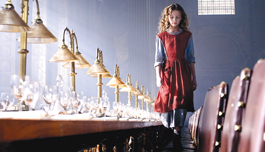home | metro santa cruz index | movies | current reviews | film review

Photograph by Laurie Sparham
PRODIGY: Dakota Blue Richards' Lyra bounces between two worlds in 'The Golden Compass.'
No Direction
'The Golden Compass' is all over the map
By Richard von Busack
I haven't read Philip Pullman's trilogy His Dark Materials, but the idea of a fantasy writer taking revenge on the Catholic Church for Galileo sounds like justice. Yet if that's what you're looking for in film version of The Golden Compass, the fundamentalists get it much worse in The Mist. Director Chris Weitz' busy, impersonal adaptation of the first novel in Pullman's epic makes it clear enough that the essence of the story is a battle of free will vs. blind faith. That's about the only thing that's clear. Laying the foundation for a fantasy franchise, The Golden Compass looks like a long pre-title sequence. To be fair, the parallel-earth fantasy is engrossing, scene to scene. And it's pretty, with its roaring bears, magic-powered zeppelins and horseless carriages powered by glowing blue spheres. Everyone's soul takes the form of an animal, so there are any number of talking critters lurking about. One noble scene has flying witches darkening the sky like migrating birds. In aerial battle, they carry bows and arrows, and they look very troublesome. Unfortunately, for all its gilded effects and wonders, The Golden Compass possesses as little center as a donut. The action always seems to be taking place elsewhere.
Somehow, our petite, spunky heroine, Lyra (Dakota Blue Richards), ends up in the snow-white talons of Nicole Kidman's Mrs. Coulter, who goes back and forth between plotting to murder her and wanting to snuggle. Daniel Craig as Lord Asriel, tweeded and bearded, strides into the snow like a man set on saving the world(s), but he's promptly captured by Earth-2 Inuits, only to reappear in a lab, staring at some test tubes. Sam Elliott turns up as Lee Scorseby. Elliott is the master of embodying a child's fondest dream of a friendly cowboy. When meeting our young heroine Lyra on the polar frontier, Scorseby tips her off to a down-and-out bear called Ragnar. The bear has Dean Martin's problem from Rio Bravo, but then Ragnar (voiced by Ian McKellen) reveals himself as a polar bear Hamlet, who needs to deal with an evil usurper king (Ian McShane, in fine bearish voice).
I could not recount the whys and wherefores of The Golden Compass if you held a gun to my head. The film exemplifies what Joe Bob Briggs called "the plot getting in the way of the story." Why does Coulter suddenly notice the girl who is—it figures—special in that special mythical way that people make prophecies about? Why does the witch Serafina (Eva Green) turn up and then promptly fly away? Even the godless had to thank God at the sight of Christopher Lee sitting at a round table with some fellow villains. He is our dark compass in this bewildering film. When you see Christopher Lee, you know what he's up to, and he knows what he's up to. Lee vanishes, naturally. So does Green, who finally reappears at the end of the picture. The next-to-last shots of The Golden Compass show Green and Elliot making some very cozy glances at each other. This must be one of the five or six something-elses we can trust are going to be in the damned sequel. Adult romance is completely MIA in this fantasy. At least Tolkien, whose work was soaked with World War II, remembered how many desperate love affairs occur when warriors are about to ship out, whether it's to Anzio Beach or Minas Tirith.
![]() THE GOLDEN COMPASS (PG-13; 113 min.), directed and written by Chris Weitz, based on the book by Philip Pullman, photographed by Henry Braham and starring Nicole Kidman and Dakota Blue Richards, plays countywide.
THE GOLDEN COMPASS (PG-13; 113 min.), directed and written by Chris Weitz, based on the book by Philip Pullman, photographed by Henry Braham and starring Nicole Kidman and Dakota Blue Richards, plays countywide.
Send a letter to the editor about this story.
|
|
|
|
|
|